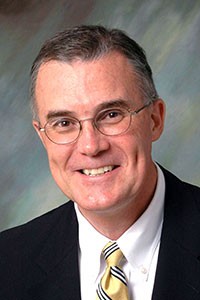
James Alleman
Email: jea@iastate.edu
Title(s):
Professor (emeritus)
Civil, Construction and Environmental Engineering
Office
420 Town Engr
813 Bissell Rd
Ames, IA 50011-1066
Information
Honors and Awards
- Jefferson Science Faculty Fellow, U.S. Department of State, 2014
- Fellow, American Society of Civil Engineers, 2010
- Diplomat, American Academy of Environmental Engineers, 2010
- Fulbright Research-Scholar, 2005
- Best Core Teacher Award (Wansik Award), Purdue University School of Civil Engineering, 2002
- Best Researcher Award (Wansik Award), Purdue University School of Civil Engineering, 2002
- American Consulting Engineers Council Award, 1986
- Outstanding Teacher Award (Harold Munson Award), Purdue University School of Civil Engineering, 1985
Education
- Ph.D. Environmental Engineering, University of Notre Dame, 1978
- M.S. Civil Engineering, University of Notre Dame, 1972
- B.S. Civil Engineering, University of Notre Dame, 1971
Interest Areas
Environmental engineering systems
- Wastewater and residuals treatment
- Wastewater nutrient removal
- Constructed wetlands wastewater systems…and particularly highway rest stop applications
- Thermophilic wastewater and residuals processing
Sustainability engineering
- Pavement albedo and ‘urban heat island’ impact
- Sustainable infrastructure rating systems
- Cement carbon concentration, capture, and conversion
- Beneficial reuse of waste foundry sand…and aspects of trace metal contaminant release and impacts
- Coal ash radiation release
- Waste brine reuse in relation to highway anti-icing and deicing
- Constructive reuse of wastewater residuals…including brick manufacture
History of Engineering
- Nitrogen genesis and metabolism
- Asbestos
- Ancient to Victorian-era water and wastewater treatment
- Iconic college campus bell tower design
- Golden Gate Bridge
Publications
- J. K. Sikkema, J. E. Alleman, S. K. Ong, and T. D. Wheelock. (2011) “Mercury Regulation, Fate, Transport, Transformation, and Abatement Within Cement Manufacturing Facilities: Review,” Science of the Total Environment, Vol. 409, pp. 4167-4178 (DOI: http://dx.doi.org/10.1016/j.scitotenv.2011.05.064).
- E. R. Blatchley III, W. L. Gong, J. E. Alleman, et al. (2007) “Effects of Wastewater Disinfection on Waterborne Bacteria and Viruses,” Water Environment Research, Vol. 79, No. 1, pp. 81-92 (DOI: http://dx.doi.org/10.2175/106143006X102024).
- M. K. Banks, A. P. Schwab, J. E. Alleman, M. Switzenbaum, N. Cofield, and J. Shalabi. (2007) “Biosolids Amended Soils: Part I. Effect of Biosolids Application on Soil Quality and Ecotoxicity,” Water Environment Research, Vol. 78, No. 11, pp. 2217-2230 (DOI: http://dx.doi.org/10.2175/106143005X86637).
- K. M. Sears, J. E. Alleman, J. Barnard, and J. A. Oleszkiewicz. (2006) “Density and Activity Characterization of Activated Sludge Flocs,” Journal of Environmental Engineering – ASCE, Vol. 132, No. 10, pp. 1235-1242 (DOI: http://dx.doi.org/10.1061/(ASCE)0733-9372(2006)132:10(1235)).
- K. M. Sears, J. E. Alleman, J. Barnard, and J. A. Oleszkiewicz. (2005) “Feasibility of Using Ultrasonic Irradiation to Recover Active Biomass from Waste Activated Sludge,” Journal of Biotechnology, Vol. 19, No. 4, pp. 389-399 (DOI: http://dx.doi.org/10.1016/j.jbiotec.2005.04.025).